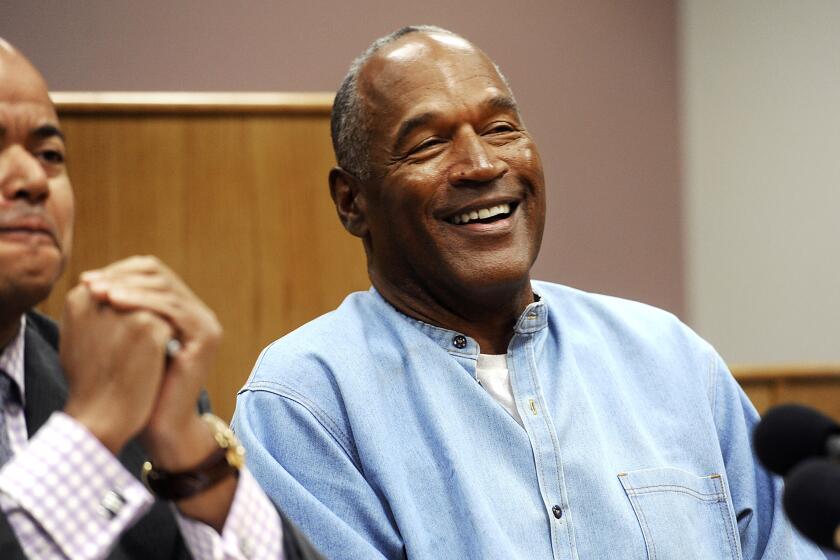West Hollywood Assault Victim Faces Life Sentence
In some ways, life was easier for Trev Broudy in September, when he was hooked up to machines in the intensive care unit at Cedars-Sinai Medical Center. As he was rushed into surgery, as he lay in a coma, as friends and family held prayer vigils, his pain was obvious.
Now, the handsome 34-year-old looks and sounds as fine as anyone, only he isn’t and never will be.
The baseball cap on his head covers a thick, horseshoe-shaped scar. It’s the souvenir of recent surgery, when a plate was inserted where the skull used to be. His deep-blue eyes appear clear and sharp, but they see only a narrow slice of what’s in front of them.
He speaks with growing ease, but simple words often elude him. The college graduate, who once had a good career as a voice-over artist, now struggles to read a sentence, let alone a script.
When Broudy was at Cedars-Sinai, his story was news. Cards poured in for the young gay man, who had been smashed in the head with a baseball bat on a quiet West Hollywood street after he had hugged a male friend goodnight.
Reports of a suspected gay bashing in a predominately gay neighborhood brought him unasked-for fame.
Now, Broudy is back in his apartment. But he can’t return to his old life.
He struggles, sometimes optimistic, sometimes deeply depressed -- one day accepting the present, another dwelling with terror on the future.
“People assume because I look all right and I’m healthy and I’m walking and I’m talking, I’m all better,” he said. “But I’m not. And I don’t know if they want to hear that.”
Friends call Broudy their hero. They speak of his story as inspirational. And in many ways, it has been.
“He is our Matthew Shepard except he lived,” West Hollywood Councilman John Duran said of the passion with which his city rallied in support.
People who only casually knew Broudy dropped everything to help him. His divorced parents and stepmother, who arrived in West Hollywood terrified, not even sure what “gay bashing” meant, found themselves warmly embraced by a community and, bit by bit, embraced it back.
*
Attacked With a Bat
On Sept. 1, Broudy was saying goodbye to his friend Teddy Ulett when a man jumped out of a car and began swinging at Broudy’s head with a bat.
A witness told sheriff’s deputies that another attacker beat Broudy with a pipe. Ulett, who was in his car when the attack began, was hit in the arm, but managed to drive off.
Later this month, three men are scheduled to go on trial in the attack, which prosecutors say was an attempted robbery.
The suspects, who have pleaded not guilty, do not face hate crime charges. The district attorney said there was no evidence that prejudice was a factor.
The night Broudy arrived at Cedars-Sinai, surgeons cleaned away shards of skull from the back of his head and pieced back together other parts of skull that had been crushed.
The next day when his brain swelled, they operated again. For more than a week, Broudy was in an induced coma to guard against more swelling.
It was not until Oct. 10 that Broudy walked out of the hospital -- into a world he no longer could understand. He didn’t know how to turn on his computer or how to put words together in a sentence.
At first, he thought his troubles were temporary -- that he soon would be back at work.
But weeks later, when he asked when he would see normally again, a doctor told him that he never would, that the loss of half the vision in both of his eyes was permanent.
“She said, ‘Trev, of course you know that a major part of your brain was removed,’ “Broudy said. “But I didn’t know. I was like, ‘No, that can’t be true.’ And she said, ‘No, that’s the truth.’ And I just started sobbing uncontrollably and she didn’t know what to do, and I didn’t know what to do and everyone there in the office didn’t know what to do.”
Broudy belatedly learned that doctors trying to save his life had removed, not just dead, but also healthy brain tissue. A big chunk of his occipital lobe, crucial to sight, was gone. So was a part of his parietal lobe, leaving it hard for him to name objects, do math, read and focus.
“Suddenly, I realize this is the rest of my life -- never being able to see and never being able to read and never being able to drive and then all the other cognitive functions that have been evaporated from my head,” Broudy said.
*
Past Is Not Present
In Broudy’s small West Hollywood apartment, the gap between his past and present is palpable.
His walls are covered with paintings and travel photographs. His living room bookcase is crammed with books -- Katharine Hepburn’s autobiography, a history of the 1929 stock market crash, Stephen Hawking, David Sedaris. In one corner is a small piano. On it sits a deck of cards he now often uses to push himself. It is labeled “Multiplication 0-12.”
In a small office area off the kitchen next door, Broudy sat in front of his computer, his cognitive therapist beside him.
“Do you like comic books?” asked Michael Chesebro, the therapist.
“I guess,” Broudy said. “I don’t know.”
Chesebro, who works with Broudy three times a week, immediately picked up on the disappointed body language. Comic books, he said, are good practice for reading. You don’t see too many words at once.
“It’s so frustrating for you because you want to read at the level you did before. You can’t and that’s very frustrating,” the therapist said gently. “But I’m trying to help you have lots of little victories and no big defeats.”
Broudy doesn’t always give himself credit for how far he’s come. At the hospital, when he awoke from his coma, he didn’t know where he was or what had happened. His father, Sherrill, had trouble explaining.
“He was a mass of bandages and it was so random. It could have happened to any one of 1,000 guys there,” Sherrill Broudy said. “It’s just that Trev happened to walk out on the street at the wrong time.”
He and other family members also had to explain much more. Broudy didn’t recognize the letters of the alphabet and asked what they were. He grew so frustrated by his inability to tell time that his parents covered the wall clock with a shirt.
Outside the hospital, he faced even more frustration. The first time he went alone to the supermarket, he broke down, unsure where to find things, unable to find the words to ask for help.
It could have been worse, Broudy sometimes thinks. His parents knew he was gay. Still, the West Hollywood spotlight could have made them deeply uncomfortable.
Even for Broudy, the attention was odd. He is a private person. He was never much of a Santa Monica Boulevard clubgoer. He has had only one serious boyfriend. But suddenly, he was “the gay poster boy,” he said, referred to in news articles as “gay actor Trev Broudy.”
“I’m very comfortable with who I am, but I’m not exactly the gayest of the gay,” he said, laughing.
As for his parents, they have always been supportive, Broudy said. But he and his father had never talked about Broudy’s sexual orientation.
The gay lifestyle in West Hollywood was new to Sherrill Broudy and his wife, Charlene. But they learned to appreciate it.
“What a revelation. We’d walk out the door and it was just a different world out there, just pairs of fellows holding hands,” said Sherrill Broudy, 80. “We got to know Trev’s friends, and in almost every case they were really great guys.”
He said his son had often said that he didn’t have many friends. “We said, ‘Trev, you were lying to us.’ ”
In fact, friends have been devoted. Terrance Wright moved into Broudy’s apartment to help him make sense of the mountains of medical bills, to accompany him to appointments, to be there for him. Dave Walsh, a fellow voice-over artist, is patiently helping him practice scripts.
Councilman Duran, who met Broudy after he was released from Cedars-Sinai, sees him often. He comes to the apartment to run the multiplication tables, to drill Broudy on words, to help Broudy relearn the piano. When someone wants to interview Broudy, Duran often is present. If Broudy can’t find a word, Duran is there to help.
But it’s hard to understand how differently Broudy’s brain now works.
Several weeks ago, when the Gay & Lesbian Alliance Against Defamation asked Broudy and Duran to present an award together at its annual media awards, Duran thought he could hand Broudy a two-paragraph script the day before the event at the Kodak Theater.
All day, Broudy stared at the sentences. Reading them was hard, memorizing them impossible. When he said he couldn’t do it, Duran told him he could use cue cards.
Broudy had to explain that would not solve his problem -- that he now sees letters one by one, floating untethered, and he has to glue them together in his head to construct words.
That night, he stood on the stage and spoke without a script, from the heart.
The audience gave him a standing ovation. In that moment, he said, he realized that he could survive -- perhaps even thrive as a public speaker, fighting violence and prejudice. He was full of hope.
*
Hope and Despair
Lately, hope and despair have taken turns hijacking Broudy’s head. He tries to be upbeat and smiles when friends marvel at his progress. Sometimes, he sees it too.
But he goes through stretches when he can’t sleep. He lies in the dark with a head full of dark thoughts.
In those moments, he said, he sometimes wishes the attack had killed him or that at least he had been an old man when it happened. Recently, such thoughts kept him in bed for an entire weekend.
“The one thing that really screws me up is when I start thinking, ‘What will my life be like 30 years from now or 40 years from now or 50?’ ....,” he said.
“I start imagining what it’s going to be like a year from now. I mean, where will I be? I can’t rely on my friends for the rest of my life -- maybe for a year. But then what do I do?”
Broudy is furious about what was done to him, and frustrated that he can’t contribute any memories of the attack. Maybe, he thinks, erased from his head is a crucial detail that could support a hate crime charge.
Still, the district attorney added aggravated mayhem charges after learning the extent of Broudy’s injuries. They could yield life terms. Broudy said he hopes so.
As for his own life sentence, “I have to think of it one day at a time, just one day at a time. I have to focus on that every moment,” he said. “This is the first time in my life that I’ve really understood the idea of really living right in the moment. Because what else can I do? How else do I face this?”
More to Read
Start your day right
Sign up for Essential California for news, features and recommendations from the L.A. Times and beyond in your inbox six days a week.
You may occasionally receive promotional content from the Los Angeles Times.







